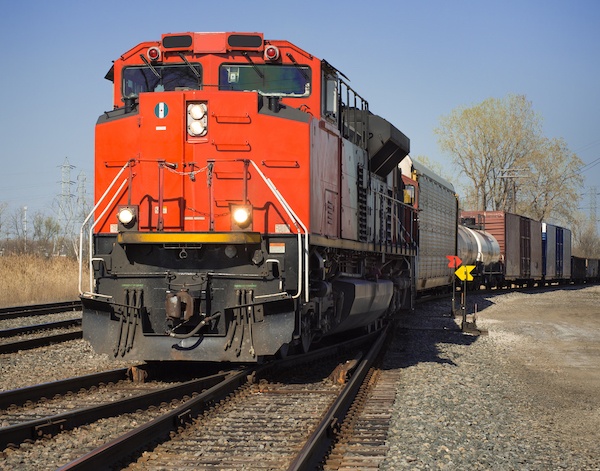A Self-Reliant Transportation Giant: The U.S. Freight Rail System
Posted by Donald Robinson
Jun 9, 2016 10:18:47 AM

Last week we kicked off our logistics series looking at air cargo. If you missed that post, check it out here. Today we're continuing the series with a look at the freight rail system in the United States.
The U.S. freight rail system is one of the most powerful, lucrative transportation industries in the world, with more than $433.2 million in operating revenues and 140k miles of railway infrastructure. The U.S. railway system moves more consumer and bulk commodities than any other freight rail system in the world and provides more than 220,000 jobs nationwide.
A Self-Reliant Transportation Giant
U.S. freight railroad networks are privately held organizations that conduct their own maintenance and development affairs. They contribute one of the highest percentages of revenue to their own upkeep and infrastructure improvements when compared with other major transportation industries. Most of the revenues related to railway expenditures are allotted to maintenance and upkeep while 15-20% are directed to capacity improvements.
Bulk and Consumer Goods Depend on the Railway System
Railroad freight accounts for more than 40% of ton-miles in the U.S. freight industry when rail, pipeline, truck, air, and water transport are accounted for. When weight alone is considered, the percentage of freight carried by rail is at 16%. Bulk freight like hazardous materials, coal, and grain ship in rail cars, while consumer items destined for local commerce ship via intermodal containers, the fastest growing division of the freight rail industry. An intermodal container shipment is of the type where the initial or final destination of the shipped goods occurs on a different mode of transport, such as ships, trucks, and planes, before being transferred to the railway system.
Railway Freight is Diverse and Efficient
Consumer goods make up about 9% of railway freight shipments in the form of intermodal traffic, and the other 91% is made up of bulk commodities. Bulk commodities include automobiles, construction materials, agriculture products, chemicals, heavy equipment, energy materials, coal, minerals, food, metals, paper, and pulp. Heavy freight is best moved by rail over long distances, and raw materials are usually shipped in some combination of rail, water, and truck transport.
The Future of Railway Freight
Since the future of rail freight is expected to grow exponentially, the transportation industry can expect to see more expenditures and investments in capacity to handle bulk and heavy cargo over long distances. These investments are likely to center around manufacturing centers, container ports, and rural, agricultural areas or remote areas where power plants and energy products are typically located.
The global market demands multiple efficient methods of transportation infrastructure to meet growing consumer demands, and the railway system is one of the shipping mainstays with a stable, lucrative history and a promising future of growth and profit. In addition to providing benefits to global and national commerce and trade, the railway freight industry contributes to a reduction in roadway congestion, reduced fuel emissions and consumption, fewer logistics expenditures, reduced highway fatalities, and lower public infrastructure costs.
While the freight rail system is an established, reliable method of shipping bulk and consumer goods, intermodal shipments are clearly the shipping mode of the future. With an integrated shipping system and improvements in infrastructure, the freight rail system has a promising future as a mainstay in logistics and transportation.
We certainly learned something new when doing research for this post, and we hope you did as well. Let us know your thoughts on the U.S. freight system in the U.S, or thoughts about our logistics series in general by commenting in the box below. Next week we will wrap up the series looking at over the road transportation. Stay tuned!
Topics: Logistics
Subscribe to Email Updates
Contact Us Today!
Louisville Switching Service
DBA Louisville Switching Truck Sales
Phone: 502.935.5838
7400 Intermodal Drive
Louisville, Kentucky 40258-2866
Meet the Staff
Learn more about our people
Recent Posts
Posts by Topic
- Louisville Switching (51)
- Louisville Switching Truck Sales (29)
- Ottawa Trucks (22)
- Yard Trucks (21)
- Kalmar Trucks (20)
- Ottawa Dealer (20)
- Yard Dogs (18)
- Yard Truck (17)
- Mid America Truck Show (16)
- Ottawa yard trucks (16)
- Employee Spotlight (15)
- Ottawa truck parts (12)
- Ottawa Terminal Tractors (11)
- Customer Service (9)
- Industry News (8)
- Ottawa Dealers (7)
- ottawa yard truck parts (7)
- refurbished ottawa trucks (7)
- yard switcher (7)
- Company News (6)
- Insta Chain Automatic Ice-Chains (6)
- Insta-Chain (6)
- Louisville Ottawa Dealer (6)
- Ottawa (6)
- Ottawa Truck (6)
- ky (6)
- spotter truck (6)
- yard truck parts (6)
- Logistics (5)
- Ottawa truck safety (5)
- events (5)
- Kalmar (4)
- Kalmar Ottawa Dealer (4)
- Louisville Switching Services (4)
- Louisville Switching parts department (4)
- Mobile Repair (4)
- Ottawa Truck Dealer (4)
- Ottawa terminal tractor (4)
- Parts Department (4)
- Truck parts (4)
- Automatic Icechains (3)
- Cummins Diesel Engine Parts (3)
- Jobs (3)
- Louisville Ottawa trucks (3)
- Maintenance (3)
- Ottawa Kalmar (3)
- Ottawa T2 (3)
- Ottawa Truck Dealers (3)
- Ottawa Yard Truck Dealer (3)
- Ottawa reliability (3)
- Ottawa truck service (3)
- Parts and Service (3)
- Refurbished Trucks (3)
- Truck repairs (3)
- refurbished Ottawa (3)
- Fleetguard Filters (2)
- Louisville Switching Family (2)
- Louisville Truck Sales (2)
- New Ottawa Trucks (2)
- Ottawa Truck Leasing (2)
- Ottawa parts (2)
- Partnerships (2)
- Preventative Maintenance (2)
- Terminal Tractors (2)
- Weller Reman Truck Parts (2)
- Yard Spotter (2)
- Yard Truck service (2)
- automatic ice chain dealer (2)
- automatic ice chain parts (2)
- Community (1)
- Ottawa Lease (1)
- Premier Partner Dealer (1)
- Renting vs. Leasing (1)
- Truck Parts Delivery (1)




Comments